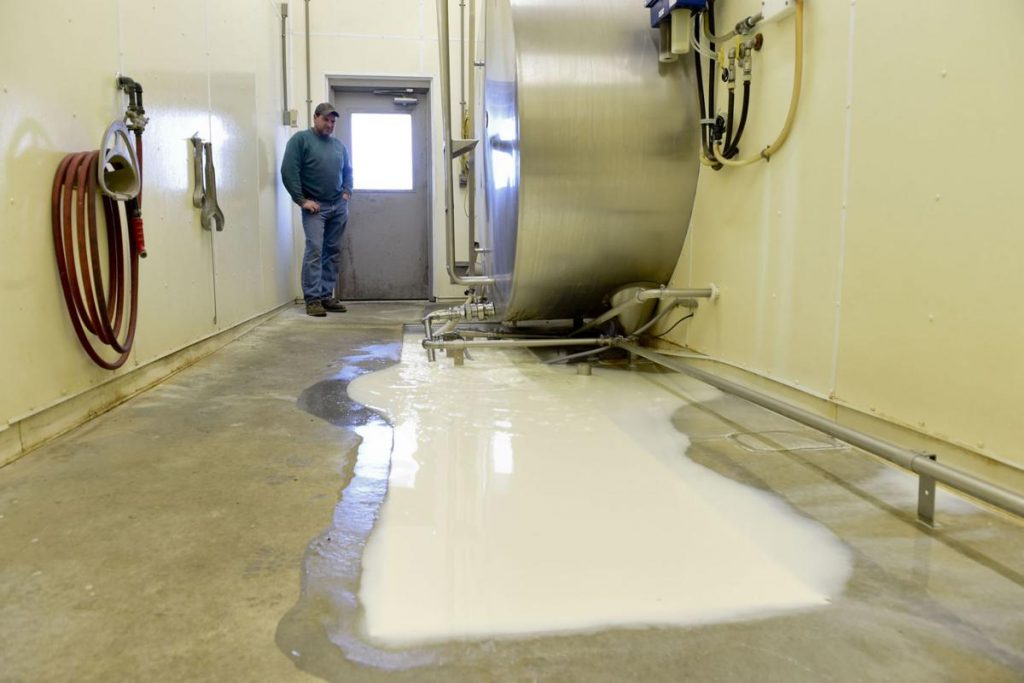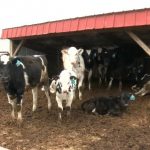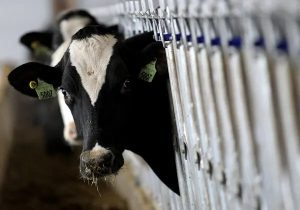
Producers who send their milk to Clover Farms Dairy for processing were told to dump two-days’ worth of milk, said dairy farmers Dave Wolfskill and Paul Hartman.
Wolfskill of Mar-Anne Farms, in Lower Heidelberg Township, said he dumped 5,500 gallons of milk on Tuesday.
“I’m third generation,” Wolfskill said. “My family has been milking cows in this valley since 1948, and we’ve never been asked to do this.”
Hartman, who with his two brothers manages Scattered Acres farms in seven townships in Berks and Lancaster counties, said he dumped 32,000 pounds of milk on Tuesday, and expected to dump a comparable amount on Wednesday, as requested by Clover Farms.
Wolfskill’s total loss for the two days was estimated at 47,000 pounds. Dairy farmers are paid by the hundredweight, 100 pounds.
“It’s enough to fill a tanker truck,” said Hartman, who received a letter from his milk truck driver on Monday notifying him to dump milk Tuesday and Wednesday.
On USDA letterhead, the subject of the March 27 letter was “COVID-19 Federal Milk Market Order Provision Flexibilities.” It was addressed to Northeast federal handlers from Shawn M. Boockoff, market administrator in Boston.
According to farmers, producers for Clover Farms were instructed to dump their milk because the dairy is full.
Reached Tuesday morning, Cheryl Caruso, milk accounting director at Clover Farms Dairy, declined comment except to say, “Things are changing hour by hour.”
“It gets personal,” Wolfskill said. “It’s your pride and joy — and hard work of your employees — going down the drain.”
“It’s just so sad to see so much food going down the drain,” Hartman said.
“I hate to see a food resource wasted,” said state Sen. Judith Schwank, a Ruscombmanor Township Democrat. “I think the schools being closed drastically reduced demand. Too much milk was coming in.”
The farmers will be paid for the dumped milk, and milk pickups are resuming on Thursday, according to the federal milk order letter.
“It’s just the situation with COVID-19,” said Jayne Sebright, executive director of the Center for Dairy Excellence in Lancaster.
“School sales are down, service sales are down,” she said. “It’s really challenging.”
Dairy producers will be eligible for stimulus checks in connection with the loss, Sebright said.
Still, Hartman said, farmers are “a little nervous.”
“They told me demand for the last two weeks had increased,” Hartman said. “Then all of a sudden, it just stopped,” he said.
Hartman and Wolfskill believe that coronavirus fears sent people scrambling to stores to stock up on milk, which emptied shelves. So demand spiked and then plummeted.
As for questions about how the milk could be used rather than dumped, such as feeding calves, the farmers said storage is an issue for such high volume, along with other logistics.
“In normal times, excess school milk is donated to food pantries,” Schwank said.
But those donations involve milk that’s already processed and packaged.
“I’m hoping things will level out,” Hartman said.
Both Schwank and Sebright urged dairy producers to keep good records of what they’ve lost.
“It’s so important, if they are dumping, that producers are recording it, because hopefully there will be some relief provided,” said Sebright, who noted there is help for creating a contingency plan at https://www.centerfordairyexcellence.org/contingency-planning/.

























